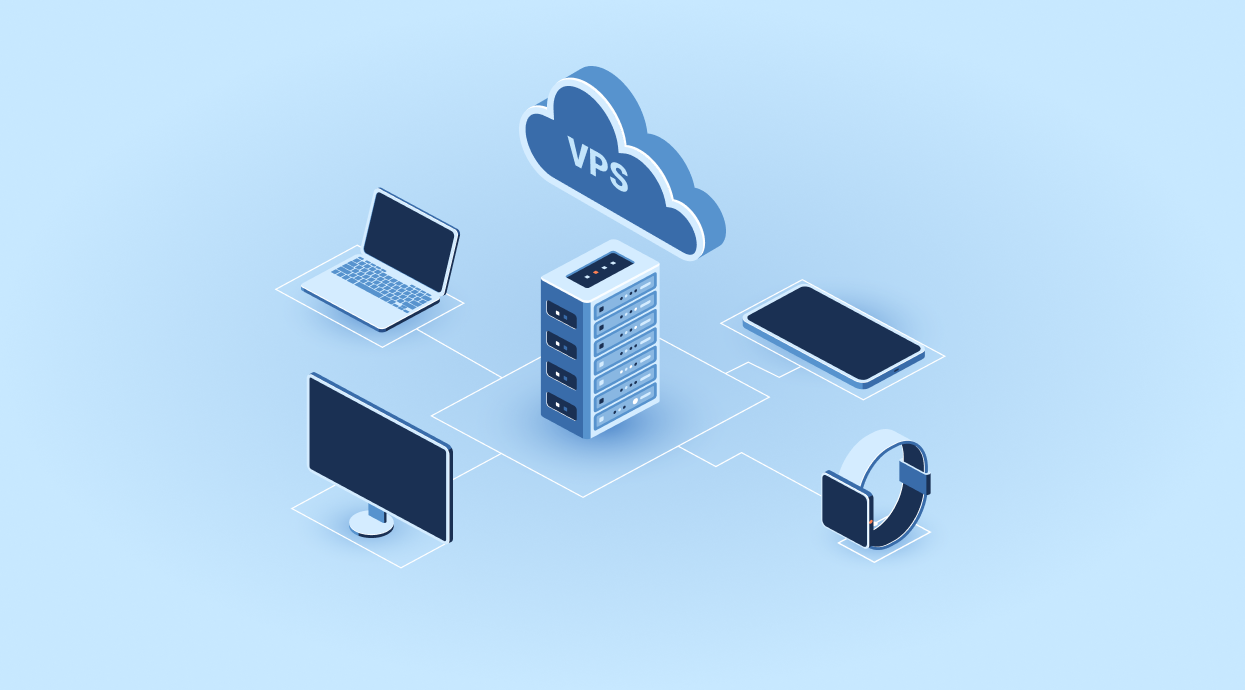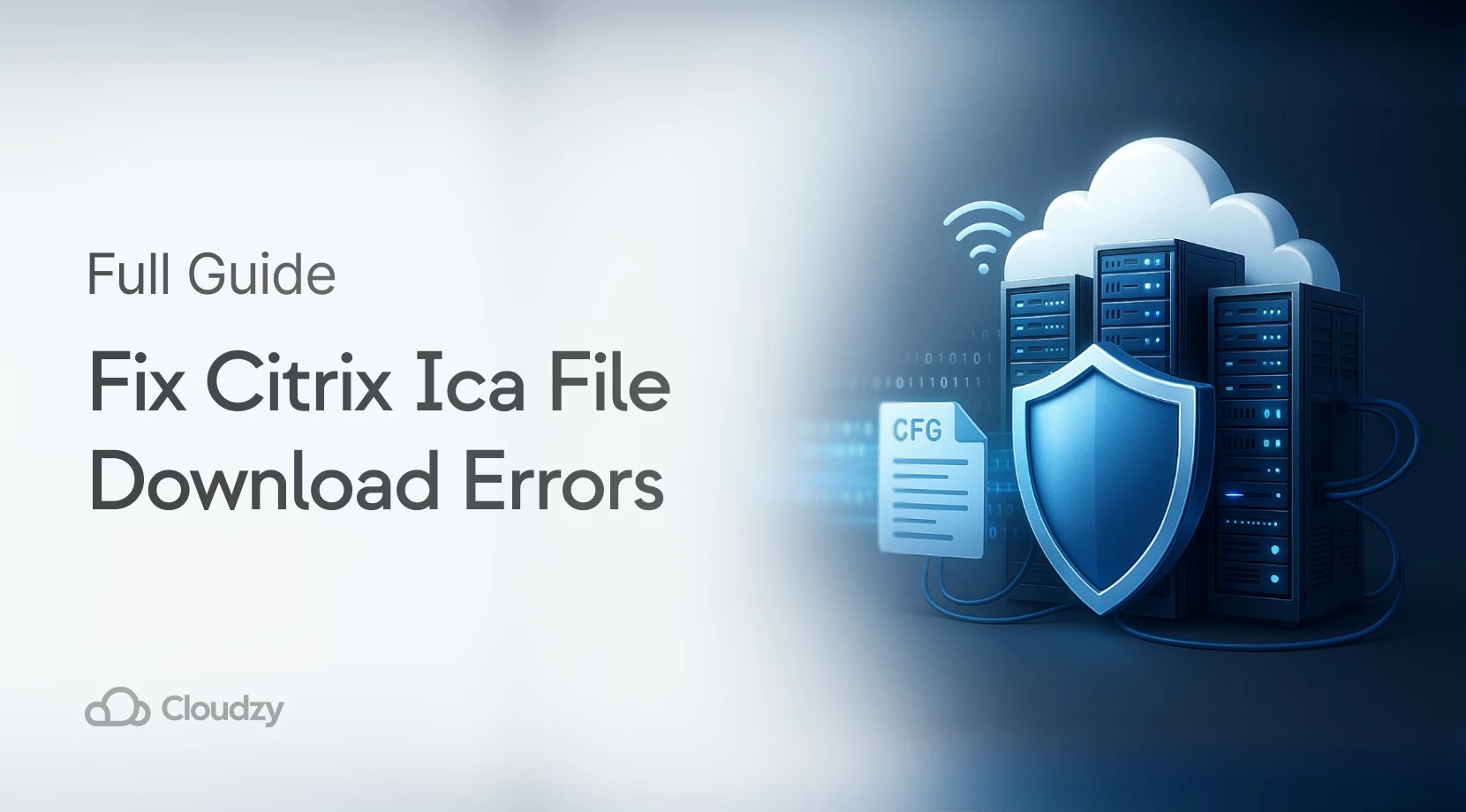In 2024, with about 1.09 billion websites live globally and 252,000 new sites created daily, the competition for speed and reliability in hosting has never been fiercer. That’s when the difference between cloud hosting vs VPS becomes so important. In this guide, we’ll dig into the difference between VPS and Cloud Hosting, explore their strengths, and help you make the best choice. Plus, we’ll show you how providers like Cloudzy are leading the way with innovative solutions that blend the best of both. Let’s get into it!
What is VPS Hosting?
Virtual Private Server Hosting, is like renting your apartment in a busy city. You’re still part of a larger building (the physical server), but your unit is completely your own. You’ve got private resources, your locks, and no nosy neighbors peeking into your space. So, how does a VPS infrastructure work? A physical server is split into smaller virtual servers using virtualization technology. Each VPS acts as its mini-server with dedicated resources like CPU, RAM, and storage.

Here are the main VPS hosting benefits and drawbacks so that we can find the difference between cloud hosting vs VPS later in this post:
Advantages of VPS Hosting
- Isolated and shielded VPS servers VPS infrastructure.
- Root access allows for custom software and configurations.
- Consistent performance powered by dedicated hardware resource sharing.
- Errors from other users in parallel VPS instances do not impact your VPS servers.
- High value due to low initial setup costs and fixed fees.
Disadvantages of VPS hosting:
- Limited scaling, as it often requires manual intervention and potential downtime.
- Management and care require good IT skills or the more expensive managed VPS service.
- Single point of failure, as errors on the physical server can affect all VPS segments.
- Performance remains limited to the physical server’s hardware resources.
Best for:
- Small to medium businesses
- Developers
- Websites with moderate traffic
 Start Blogging
Start Blogging
Self-host your WordPress on top-tier hardware, featuring NVMe storage and minimal latency around the world — choose your favorite distro.
Get WordPress VPS
What is Cloud Hosting?
Now, to compare cloud hosting vs VPS, let’s talk about what cloud hosting is and how it works.
Cloud hosting solutions shine in today’s world, where a staggering 92% of global traffic comes from Google. The emphasis is on uninterrupted access and uptime, which is why virtual cloud hosting is like having your website or app supported by a whole team of servers instead of relying on just one.
Here’s how virtual cloud hosting solutions work: Instead of being tied to a single physical machine, your resources are spread across a network of interconnected virtual servers housed in remote data centers. Think of it as renting a hotel room; if your room is too small or has an issue, you’ll be moved to a bigger and better one.
Naturally, you might think it costs a pretty penny to “rent a hotel room,” but you’ll be pleasantly surprised to find out how cost-effecting cloud hosting is.
Here are the main cloud hosting benefits and drawbacks to find out the Find out about cloud hosting and VPS hosting:
Advantages of Cloud Hosting:
- Practically unlimited scalability with on-demand resource allocation.
- Downtimes are rare due to server redundancy; if one fails, others can take over.
- Pay-as-you-go pricing mode allows you to pay only for what you use.
- Built-in security measures
Disadvantages of Cloud Hosting
- Limited customizability; limited root access in only some cases.
- Requires a reliable internet connection.
- Since it’s connected to the internet, there’s always a risk of cyberattacks.
- Moving from a cloud provider can be difficult due to vendor lock-in.
Best for:
- Any business with highly fluctuating workloads.
- Those who lack a high level of IT expertise.
- High-reliability needs

Cloudzy’s Cloud VPS: The Perfect Mix of Cloud and VPS
At Cloudzy, we’ve taken the best of both and offer something even better: Cloud VPS. This hybrid hosting model combines the dedicated resources of traditional VPS hosting with the flexibility and scalability of cloud hosting. The result? A hosting experience that’s reliable, powerful, and tailored to your needs.
Cloudzy’s Cloud VPS server bridges the gap between VPS vs cloud by offering the resource isolation of VPS hosting with the scalability of a cloud-based hosting infrastructure. You’ll enjoy the privacy and control of VPS but with the added advantage of being part of a larger, connected network.
For anyone discussing cloud hosting vs VPS, this approach gives you scalability without sacrificing control. This means enhanced reliability and the ability to scale resources up or down based on demand—perfect for businesses, developers, or gamers who need adaptable hosting solutions.
Want a high-performance Cloud VPS? Get yours today and only pay for what you use with Cloudzy!
Get Started Here
Key Features of Cloudzy’s Cloud VPS
That said, Cloudzy’s Cloud VPS isn’t just about bridging gaps—it’s about delivering features that make your life easier. Here’s what sets us apart:
- Dedicated Resources: With our cloud computing VPS, you’ll get isolated CPUs, RAM, and NVMe SSD storage, guaranteeing optimal performance without interference from other users. This distinction is a key difference between cloud hosting and VPS hosting, especially for resource-heavy applications or high-traffic websites.
- High-Performance Hardware: Powered by AMD EPYC and Ryzen processors with up to 3.2 GHz and 4.4 GHz turbo speed, respectively, and up to 10 Gbps internet connections, our Cloud VPS provides lightning-fast performance.
- Global Data Centers: With more than 15 locations worldwide, including major hubs in the US, Europe, and Asia, you’ll experience low latency and optimal speed no matter where your audience is.
- Scalability: Need more bandwidth, RAM, or CPU? No problem. Cloudzy’s Cloud VPS lets you scale your resources in real-time so your hosting grows with your needs. This flexibility is another reason why cloud hosting and VPS often lead to businesses opting for Cloudzy as one of the best Cloud VPS providers.
- DDoS Protection: Stay secure with built-in protection against cyberattacks. Your data and uptime are always a priority.
- Flexible Payment Options: At Cloudzy, we believe in giving you control over your spending. That’s why we offer Pay-As-You-Go billing, letting you pay by the hour for exactly what you use. Whether you need a Cloud VPS for a few hours or months, you’ll never overpay. Plus, we accept various payment methods, including credit cards, Alipay, PayPal, Bitcoin, and Ethereum.
Cloudzy Vs VPS Vs Cloud Hosting Pros and Cons
Now that you have an understanding of cloud hosting and VPS hosting, as well as Cloudzy as a Cloud VPS provider, here’s a comprehensive table to compare cloud hosting, VPS hosting, and Cloudzy’s services:
| Feature | VPS Hosting | Cloud Hosting | Cloudzy’s Cloud VPS |
| Resource Isolation | Fully isolated | Shared infrastructure | Fully isolated |
| Scalability | Limited (manual upgrades, downtime possible) | Seamless (real-time scaling) | Seamless and flexible (real-time scaling) |
| Performance Speed | Hardware dependent | Redundant servers for consistency | High-performance AMD EPYC CPUs and NVMe SSD |
| Reliability | Relies on physical server health | Redundant infrastructure | Combines redundancy with dedicated resources |
| Cost Structure | Fixed monthly fee | Pay-as-you-go (may spike unpredictably) | Hourly billing, transparent pricing |
| Ease of Use | Requires technical expertise | User-friendly but less customizable | User-friendly with root access |
| Customizability | Full root access for advanced configuration | Limited by provider’s restrictions | Full root access, flexible configurations |
| Security Features | User-managed (manual firewalls, backups) | Built-in encryption and backups | DDoS protection and advanced safeguards |
| Downtime Risk | Hardware failures affect your VPS | Low (multi-server redundancy) | Minimal, with both isolation and redundancy |
| Best For | Stable, predictable traffic | Fluctuating or seasonal traffic | Businesses, developers, and gamers |
| Setup Time | May require manual configuration | Quick and automated | Instant setup |
| Backup and Recovery | User-dependent backups | Automatic backups | Built-in backup options |
| Data Location Control | Single physical server (location fixed) | May span multiple server locations | Choose your server location |
| Payment Options | Limited to traditional methods | Credit card-based | Flexible: Bitcoin, Ethereum, PayPal, credit cards |
Final Verdict: Choosing Between Cloud Hosting Vs VPS Vs Cloudzy’s Cloud VPS
Picking the right hosting plan doesn’t have to feel like a hassle. The trick is figuring out what you actually need and matching it to the strengths of each option. Doesn’t matter if you’re a small business, a developer, or running a high-traffic website, the difference between cloud hosting and VPS is a defining factor for anyone. Let’s get into some real-life scenarios to help you decide.
Got an eCommerce store? Speed and uptime are non-negotiable. Did you know a 1-second delay in load time can slash conversions by 7%? Cloud-based server hosting makes sense for managing those unpredictable traffic spikes during sales, but Cloudzy’s Cloud VPS takes it a step further.
It combines real-time scalability with the dedicated resources you need to keep your store running smoothly, regardless of any spikes in traffic. That’s how Cloudzy makes the cloud hosting vs. VPS comparison irrelevant by offering the best of both.
Building an app or running tests? Developers love the control that VPS hosting brings to the table. Full root access lets you customize your environment exactly how you want it, which is a major win for those leaning towards VPS in the VPS vs cloud conversation.
Managing a content-heavy site? If you’re running a blog, media site, or platform with variable traffic, keeping readers happy is everything, as 47% of users won’t wait more than two seconds for a page to load.
Cloud hosting makes sure your site won’t buckle under pressure, while Cloudzy adds even more speed with NVMe SSD storage and AMD EPYC and Ryzen processors. Regardless of what you’re looking for or the difference between cloud hosting vs VPS, Cloudzy is the standout choice here as it gives your visitors a seamless experience every time.
Speaking of seamless experiences, bad ones can be a dealbreaker—78% of users won’t return after a security breach. VPS hosting offers secure isolation but leaves you with a lot of the heavy lifting. Cloud hosting adds built-in protections, but Cloudzy takes things further with DDoS protection and advanced encryption. It’s peace of mind, no matter what you’re hosting.
No matter your goals, we have you covered. From cutting-edge tech to flexible pricing, it’s a hosting solution that keeps up with your ambitions, no matter the size!

FAQs
Is Cloud VPS better than traditional VPS?
Cloud VPS combines traditional VPS’s resource isolation with cloud hosting’s flexibility. Unlike traditional VPS, it offers real-time scalability and better reliability through cloud infrastructure. For businesses needing both control and adaptability, Cloud VPS vs VPS often leads businesses to go for a Cloud VPS provider like Cloudzy.
Is Cloud Hosting suitable for small businesses?
Yes, cloud hosting is a great fit for small businesses, especially those with fluctuating traffic or seasonal spikes. It allows you to scale resources as needed and only pay for what you use, which is cost-effective. For small businesses comparing cloud hosting vs VPS hosting, cloud hosting’s flexibility often makes it the better choice.



